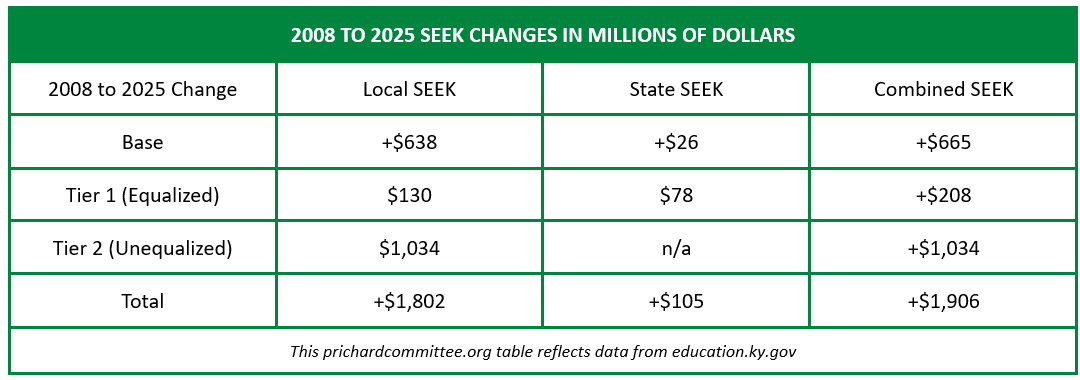November 13, 2023
FOR IMMEDIATE RELEASE
Contact: Courtney Daniel, Director of Communications and External Affairs
courtney@prichardcommittee.org
The Prichard Committee for Academic Excellence Kicks Off Family Engagement in Education Week with Proclamation at the Capitol
LEXINGTON, Ky. — The Prichard Committee for Academic Excellence celebrated the kickoff of Family Engagement in Education Week today at the Capitol Rotunda with a proclamation signed by the governor. Representatives from 52 schools and early learning centers across Kentucky were present to be recognized for being family-friendly certified.
“The Prichard Committee has long recognized the integral role of family engagement in advancing educational excellence. Today, we are not just acknowledging efforts but celebrating a culture that embraces family as a cornerstone of education,” said Brigitte Blom, President/CEO of the Prichard Committee. “Our vision is to see every school in Kentucky embrace the power of engaged families. Today, we are one step closer to that reality.”
The event featured testimonials from education leaders and partners, including Dr. Felicia Cummings Smith, President of the National Center for Families Learning; Tracey Rowe, Vice President of Programs at Learning Grove; and Dr. Channell Barbour, Chief of Staff at Partners for Rural Impact; who shared insights into their collaborative efforts.
Legislators including Rep. Derrick Graham, Rep. DJ Johnson, Sen. Amanda Mays Bledsoe and Sen. David Yates spoke as well, sharing their experiences with family engagement in education and the importance of schools and communities coming together to support students.
“As a former educator, I have witnessed the transformative effect of family engagement on student achievement. When families are involved, schools thrive. This week is a celebration of that essential partnership,” Rep. Graham said. “I want to commend all the schools recognized here today for their commitment to working with parents and bringing them into the education process.”
Research shows family engagement in education correlates with higher academic achievements and more consistent school attendance, among other benefits like teacher support and stronger community relationships.
Sen. Bledsoe also noted the importance of community and family ties in educational success. “The strength of a school’s academic program is greatly enhanced by the active participation of its families,” Sen. Bledsoe said. “It is encouraging to see such a strong turnout from schools that have fostered this connection, leading to improved student success and stronger communities.”
This event marked the third annual Family Engagement in Education Week and precedes a week of activities aimed to encourage connections between families and schools. For more information about family engagement activities and resources, visit prichardcommittee.org/week-at-a-glance or contact Laura Beard at laura.beard@prichardcommittee.org.
2023 Family Friendly Certified Schools:
- Lincoln Elementary, Dayton Independent School District
- Ludlow High, Ludlow Independent Schools District
- Mary A. Goetz, Ludlow Independent Schools District
- Erlanger/Elsmere Early Learning Center, Learning Grove
- SCAPA, Fayette County Public Schools
- Lafayette High School, Fayette County Public Schools
- *Breckinridge Elementary, Fayette County Public Schools
- Brenda Cowan Elementary, Fayette County Public Schools
- May Valley Elementary, Floyd County Public Schools
- Berea Community Elementary, Berea Community School
- East Bernstadt Independent, East Bernstadt Independent Schools
- Floyd County Early Childhood, Floyd County Public Schools
- Floyd Central High, Floyd County Public Schools
- Duff-Allen Central Elementary, Floyd County Public Schools
- Betsy Layne Elementary, Floyd County Public Schools
- Betsy Layne High, Floyd County Public Schools
- John M. Stumbo, Floyd County Public Schools
- Jenkins Independent, Jenkins Independent School District
- *Harlan Elementary, Harlan Independent School District
- *Harlan Middle/High, Harlan Independent School District
- Grace James Academy, Jefferson County Public Schools
- *Kenwood, Jefferson County Public Schools
- Washington County High, Washington County Public Schools
- Washington County Middle, Washington County Public Schools
- Washington County Elementary, Washington County Public Schools
- North Washington County Elementary, Washington County Public Schools
- North Washington Early Childhood, Washington County Public Schools
- Washington County Early Childhood, Washington County Public Schools
- Whitesville Elementary, Daviess County Public Schools
- Heritage Park High, Daviess County Public Schools
- Country Heights Elementary, Daviess County Public Schools
- Highland Elementary, Daviess County Public Schools
- Burns Elementary, Daviess County Public Schools
- Southern Oaks Elementary, Daviess County Public Schools
- Deer Park Elementary, Daviess County Public Schools
- Trigg Tots Center, Trigg County Public Schools
- *Barbourville Independent, Barbourville Independent Schools
- Growing Together Preschool, Lexington
- Clearfield Elementary, Rowan County Public Schools
- Rodburn Elementary, Rowan County Public Schools
- Rowan County Senior High, Rowan County Public Schools
- *Reidland Elementary, McCracken County Public Schools
- Conkwright Elementary, Clark County Public Schools
- Baker Intermediate, Clark County Public Schools
- Menifee Central Menifee, County Public Schools
- Niagara Elementary, Henderson County Public Schools
- Frankfort High, Frankfort Independent School District
- Second Street School, Frankfort Independent School District
- Shelby East Middle, Shelby County Public Schools
- *Northside Early Childhood Center, Shelby County Public Schools
- Jackson Independent School, Jackson Independent School District
- Whitley City Elementary
*Indicates certification at Gold Level
###












